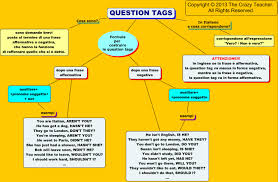Introduction
evK¨wU co, You went there. (Zzwg wK †mLv‡b
wM‡qwQ‡j|)
evK¨wU
GKwU assertive sentence evK¨wU
‡_‡K †evSv hvq ‡h e³v Rv‡b †h ev‡K¨i subject
†mLv‡b wM‡qwQj| wKš‘--- Did you go there?
(Zzwg wK †mLv‡b wM‡qwQ‡j?)
Zzwg‡Zv
†mLv‡b wM‡qwQ‡j, ZvB bv?
Basic Ideas of Tag Question
Ø
Tag
question me mgq Sentence Gi †k‡l e‡m|
Ø
Tag
question G ïay Subject Ges Auxiliary
verb em‡e|
Ø
Sentence
Gi cÖ_g Ask wU Negative
n‡j Tag question wU Affirmative
n‡e|
Ø
Sentence
Gi cÖ_g Ask wU Affirmative n‡j Tag question wU Negative n‡e|
Ø
hw` Subject G Noun _v‡K Tag questionG Noun wUi Pronoun e¨envi Ki‡Z n‡e|
Ø
‡k‡l Aek¨B cÖkœ
‡evaK wPý em‡e|
Subject Ges
Auxiliary verb Gi ms‡ÿcb|
he is/he was/He has
|
he’s
|
does not
|
doesn’t
|
|
he had/he would
|
he’d
|
are not
|
aren’t
|
|
they are/were
|
they’re
|
have not
|
haven’t
|
|
i am/
|
i’m
|
has not
|
hasn’t
|
|
we will
|
we’ ll
|
should not
|
shouldn’t
|
|
is not
|
isn’t
|
did not
|
didn’t
|
|
do not
|
don’t
|
need not
|
needn’t
|
|
can not
|
can’t
|
used not
|
usedn’t
|
|
must not
|
mustn’t
|
might not
|
mightn’t
|
Rule 1. Positive
Statement G negative
tag e¨envi Kiv nq|
a) Rahim will be here soon, won’t he?
b) She can swim, can’t she?
c) You should pass in the exam, should n’t
you?
Rule 2. Negative Statement G
Positive tag e¨envi Kiv nq|
a) He won’t help me, will he?
b) She can’t swim, can she?
Rule 3. Present
Indefinite Tense Gi †ÿ‡Î Do, does, am, is, are, BZ¨vw` e¨envi Ki‡Z nq|
a) You are intelligent, aren’t you?
b) He does not play football, does he?
Rule 4. Present Indefinite Tense Gi
†ÿ‡Î Negative tag question n‡j
don’t, doesn’t, aren’t,
e‡m|
a) He reads in the school, doesn’t he?
b) Rana and Babu
are friendly, aren’t they?
Rule 5. Present
Continuous Tense Gi †ÿ‡Î positive statement Gi †ÿ‡Î isn’t, aren’t Ges
negative
statement Gi †ÿ‡Î am, is, are e¨envi nq|
a) He is studying now, isn’t he?
b) They are not playing football, are they?
Rule 6. Past
indefinite Tense Gi †ÿ‡Î positive Gi †ÿ‡Î didn’t, wasn’t Ges negative
statement
Gi
†ÿ‡Î did, was, were e‡m|
a) I helped you, didn’t I?
b) They were not doctors, were they?
Rule 7. Present
perfect Tense Gi †ÿ‡Î positive statement Gi †ÿ‡Î haven’t, hasn’t, weren’t,
Ges
negative statement have, has e‡m|
a) You have seen him, haven’t you?
b) You have not seen him, have you?
Rule 8. Past
perfect Tense n‡j had negative statement Ges
positive statement G
hadn’t e‡m|
a) Rana had not understood, had he?
b) He had slept, hadn’t he?
Rule 9. Future
indefinite Tense Gi †ÿ‡Î negative statement G will Ges positive statement G
won’t
e¨envi Kiv nq|
a) I will go there, won’t I?
b) He won’t go there, will he?
Rule 10. Statement G hw` can, could, should, would, _v‡K
Zvn‡j G¸‡jv †K Tag Question G
e¨envi
Kiv nq|
a) You can do it, can’t you?
b) You could do the sum, couldn’t you?
c) You must go there, mustn’t you?
d) The man shouldn’t do it, should he?
Rule 11. Let us hw` Statement G e¨envi Kiv nq Zvn‡j Tag G shall, will e¨envi Kiv nq|
a) Let us go for walk, shall we?
b) Let us go home, shall we?
c) Let us help them, shall we?
Rule 12. It or there Øviv ‡Kvb evK¨ ïiæ n‡j Tag Gi ci It or there em‡e|
a) There was not enough time, wasn’t there?
b) It is good time, isn’t it?
c) It is not a bad idea, is it?
Rule 13. Statement G hw` neither, no, none, nobody, nothing, scarcely, barely, hardly,
seldom.
G‡`i †h †Kvb kã _v‡K Zvn‡j G‡`i‡K negative
statement aiv nq A_¨©vr Giv negative A_© †`q| G‡`i
cieZ©x Tag G not e‡m bv|
a) He hardly comes here, does he?
b) None can do it, can they?
c) Nothing was it, was it?
d) Neither of them went, did they?
Rule 14. Any one, any body, on one, nobody, none, neither hw`
†Kvb Statement Gi
subject iƒ‡c
e¨envi nq Zvn‡j Tag Gi subject n‡e they.
a) Nobody went there, did they
?
b) None can do this, can they?
c) Neither of them passed, have they?
d) Any one is allowed, are they?
Rule 15. Av‡`k,
Aby‡iva, cÖKvkK ev‡K¨i Tag question G
can you, could you?
a) Open the door, can you?
b) With here for a moment, could you?
Rule 16. Statement wU
affirmative n‡j
Ges Zvi subject wnmv‡e
every one, every body, some
body,
someone BZ¨vw` _v‡K Zvn‡j Tag G not emv‡Z n‡e Ges subject wnmv‡e they emv‡Z n‡e|
a) Every body saw you, didn’t they?
b) Every one could understate it, couldn’t
they?
c) Someone should this pen, hasn’t they?
Rule 17. wb‡la
cÖKvk evK¨ donot, never _vK‡j
Tag question G
will you n‡e|
a) Do not be late, will you?
b) Do not tell lie, will you?
c) Never tell a lie, will you?
Rule 18. This/that/these/those _vK‡j Tag question G it/they n‡e|
a) These are my books, are not they?
b) This is my book, isn’t it?
Practice
1)
You
need some people ho can speak English.............
a)
Can
you? b) Can’t you? c) do you? d) don’t you?
2)
He
went to the post office..........
a) Went he? b) Did he?
c) Didn’t he? d) Couldn’t he?
3)
They are my friends..............
a) Are they? b) Aren’t
they? c) Are not they? d) Don’t they?
4) Any body can read at private University.............
a) Can anybody? b)
Can’t anybody? c) Can’t he? d) Can they?
5)
There were so many students...............
a) Weren’t they? b) Were they? c) weren’t there? d) weren’t there?
Answer: 1. d;
2. c; 3. b; 4.d;
5.d;





